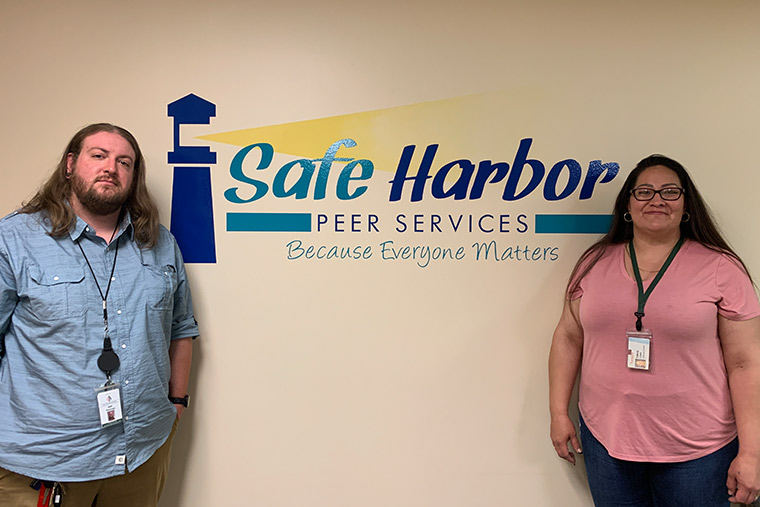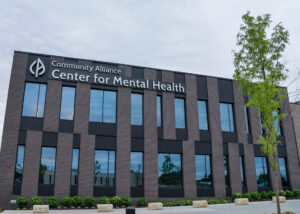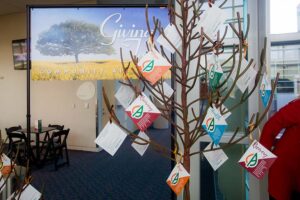From Agents of Chaos to Agents of Recovery

Peer support workers at Safe Harbor are people who have been successful in the recovery process and are dedicated to supporting others through similar circumstances. Through shared understanding, respect and mutual empowerment, peer support specialists can help those in need stay engaged in the recovery process and reduce the likelihood of relapse. In their own words, Jon Thomsen and Casey Lopez, both Peer Support Specialists at Safe Harbor, share how they are able to extend the reach of treatment beyond the clinical setting into the everyday environment.
On working their own program of recovery
JON:
The way I view it personally is that self-care is a part of the job duties. It’s a part of the job requirements, it’s part of the work, and that’s something that takes a major culture change within an organization, within an office. Now thankfully it’s built in. When I was first hired, the term that was given to me was supported employment.
CASEY:
They say it takes a village to raise a child. It takes a village to continue a life of recovery and the wellness and health that you may need in that recovery. That, for me, I feel like is a very important aspect of living a life of wellness and everything that you feed into it. For all the negative that you took out, you have to be able to replace that with something positive and be able to go forward and live that healthy lifestyle. For me, it’s a very fundamental part of my recovery – and even my choice of being a peer support specialist – to be able to give that back to the community and encourage other people to start to, build their own support networks.
On leading by example
JON:
Your record becomes your resume. And, just to piggyback on what Casey was talking about, it really is more than just med compliance. It’s more than sobriety. It’s more than just sessions in cognitive behavioral therapy. It’s a lifestyle. It is a recovery lifestyle. You’re looking at two people who eat, sleep and breathe recovery – everything goes through that filter. Casey walks through every single day looking for the next right thing to do, and it’s based on those principles, those values, those beliefs that we had to learn going into recovery, it wasn’t necessarily something that was there before.
CASEY:
It’s a process because not everybody that walks through our doors or calls us trusts us from the beginning. We have to build from the ground up. Just from having that shared life experience, we are able to put ourselves in their shoes and understand, hey, they’re kind of closed off right now. This is exactly where I was at one time. We’re able to assess the situation and, while some people are different than others, we are able to take those baby steps to build that healthy relationship, work and eventually evolve a mutual trust between each other.
On why no day is a typical day
CASEY:
It could be just a day of taking more “mild” calls and talking to people over the phone, or it could go to a higher level of need. Someone walks in and is jobless and has nowhere to go and is fighting with symptoms or addiction. But yet they don’t need to go to the hospital, and they are trying to avoid that. And we sit down, and we come up with a plan, and they make some decisions about the changes they want to make today and in their life. We map out that plan and help get them started in connecting to resources like employment services, or screening, or housing, the things they might need to get through that immediate challenge and the challenges that tomorrow might bring. At the end of the day, things look completely different than they did the moment they walked in. They have some more tools and options to consider.
On extending the hand of hope during a pandemic
JON:
The pandemic has become more than just the coronavirus. It is a pandemic of isolation. It is a pandemic of uncertainty and fear. We’re talking about people who may be already extremely isolated, and it just speaks to how important it is to be able to have someone to reach out to. A lot of people we work with don’t have what you would call natural support. They don’t have good connections with family. They’re isolated. They don’t have a lot of friends. We step into that role as peers. We become the ones that are there for them in their time of need. That can’t be quantified. There are no data points for that. You can’t put that into a spreadsheet. You just can’t. It’s so much bigger than that.
CASEY:
Being isolated at home, being away from family, not being able to pay their bills, not having adequate daycare and things of that nature. It has been a struggle – from the young to the old – and it has affected everybody in a different way. But I think almost everybody has been affected in one way or another – losing a loved one from them being sick, or questions about whether they should get the vaccine. We work with such a broad range of consumer that it’s completely different from one to the next. But everybody has been affected in some way, shape or form.
On helping make a difference
CASEY:
I tend to stay away from the word ‘helping,’ because we learn in training we’re not necessarily helping, even though I know in certain aspects we are helping. It’s not just helping them as much as it’s helping us. It’s mutual. Little do our peers know, but when they’re walking in the door, empowering them to come up with a plan and encouraging them to make better decisions, helps us to self-reflect on decisions that we’re making.
JON:
Just because I’ve worked here for six years and I’ve been in recovery for a number of years, it does not mean that I’m symptom free. It does not mean that I have some perfect cookie cutter, white picket fence life. Life’s a dumpster fire, some days. But this place… I mean, it’s in the name, Safe Harbor. This is my safe place. It has been for the entire time that I’ve been here. I’ve been able to shed more tears and feel more raw — but very authentic – emotion here than inside of any therapist’s office. I’m not trying to compare to what others may need, but you know, there’s something true… there’s something undeniable about what shared, lived experience can bring to the table.
I remember times early in my recovery where I would be unable to sleep and asking myself what’s the point? Struggling to stay sober, relapsing, getting sober, relapsing, getting sober. What’s the point? What am I even here for? Like, if this is all that my life is supposed to be, what’s the damn point? This is the point. This is why I went through that. We would not be equipped or prepared to do what we do now had we not lived through that.
It’s not a job. It’s not a career. It’s a calling. It’s what I was made to do. It is my purpose. That is one of those four main dimensions of recovery and wellness, without a purpose, what is the point?
Help is Within Reach
Community Alliance offers a full range of integrated health services including primary and psychiatric care, mental health and substance use counseling, rehabilitation and employment services, supportive housing, community, family and peer supports, and more.
RESOURCES:
Safe Harbor Peer Crisis Services



